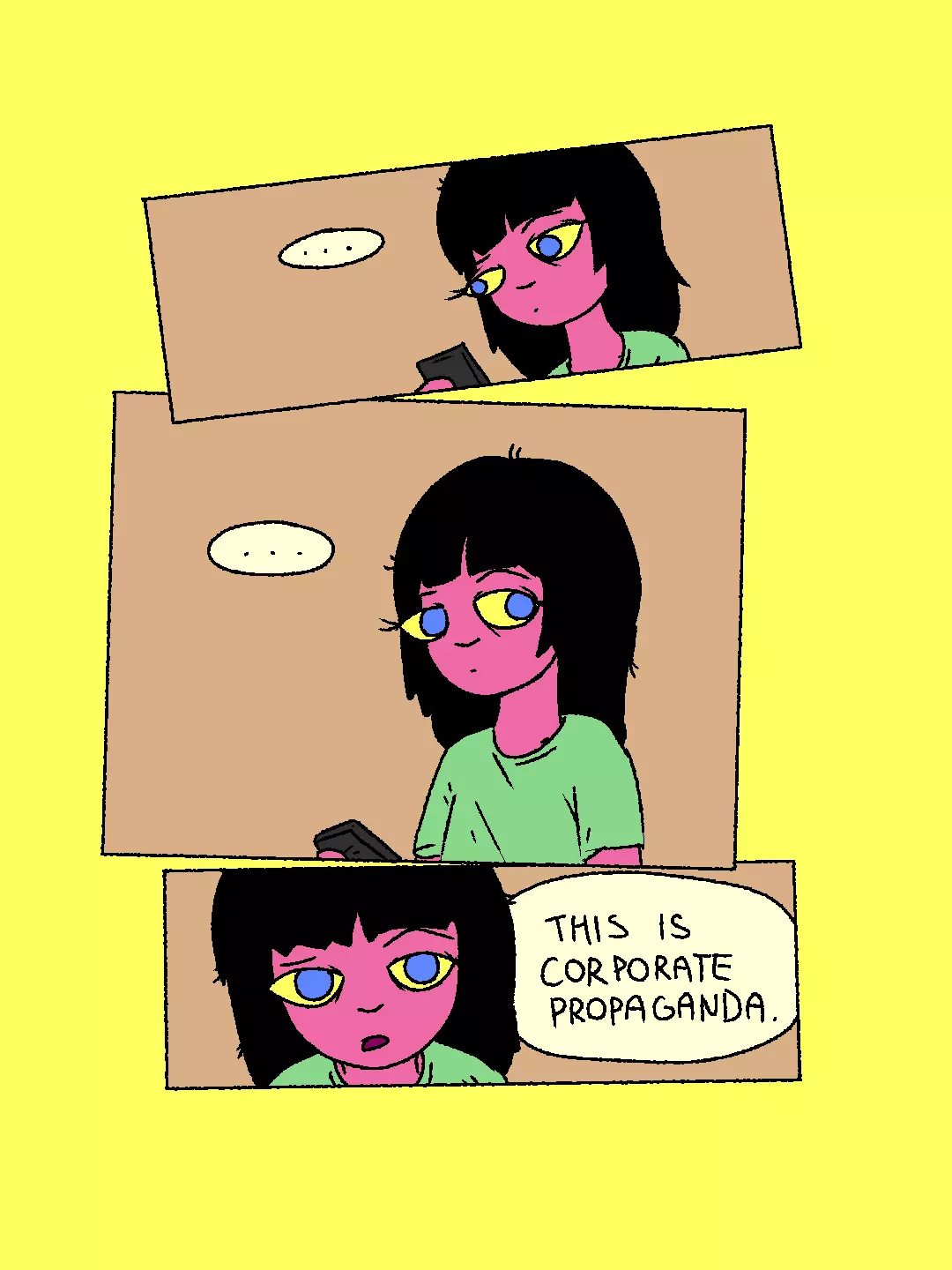Genuine question as I’m having a dilemma.
I’ve seen many of my friends using Chrome without any ad blockers. Most of them don’t even know that there are things called extensions that can be installed. Whenever I use their laptops, I want to throw them away. I want to tell them about extensions and ad blockers.
But as much as we hate ads, they fuel the internet. Without them, the internet wouldn’t be what it is today. If ad blocker users increase, there would be a massive change in the web, and everything may be paywalled.
So should we gatekeep ad blockers and enjoy an ad-free internet as a minority? It’s not like they know what they’re missing.
I advocate for FOSS, though. I will tell my friends to try Linux and dual-boot it, and suggest alternatives.
But as much as we hate ads, they fuel the internet. Without them, the internet wouldn’t be what it is today.
The corporate web wouldn’t be what it is today, the internet would be fine. This is an important distinction to make. The internet is run by a bunch of nerds going to “internet peering conventions” and paying for BGP cross-connects in data centers. They would be fine, because ad-blockers don’t hurt them.
The corporate web, on the other hand, would die. I’m very okay with that. In fact, I see that as a feature, not a bug. I hate the corporate web, and I think the world would be better without facebook and google creating monopolies on communication. But either way, if the only way technology can survive is ads (and it’s not the only way), then let it die.
So should we gatekeep ad blockers and enjoy an ad-free internet as a minority? It’s not like they know what they’re missing.
lolno. We should be doing everything we can to protect ourselves and those around us from malware, surveillance capitalism, and predatory advertising. Even if you don’t care about other people, herd immunity to malware and surveillance capitalism are very real things. It’s a lot harder to get infected by malware on an immunized network, and it’s a lot harder for facebook to surveil you (remember shadow profiles?) when nobody around you is having their every step tracked.
Consider why those people don’t even know about extensions or ad-blocking. The web was built to be extensible, but ad companies (google) have done everything they can to keep people from realizing they can just change websites however they want, including blocking ads. People aren’t ignorant about privacy because they want to be, they’re ignorant because a lot of money and manipulation has gone into keeping them unaware and unempowered.
Solidarity and support are the only real weapons we have in the war against surveillance and malvertising. If not for those around you, then at least do it for the sake of your own privacy.
deleted by creator
I am talking about people who make money off ads. Like numerous YouTubers, news sites etc. YouTube is goldmine for content. Many small-medium creators depends on adsense. Think of YouTubers like veritasium, corridor crew etc who produce high quality content to be viewed freely. Websites like anandtech, the verge etc
The corporate internet you are talking is more about sites like Facebook, insta, reddit etc who doesn’t view the content posters are creators and they definitely doesn’t share profits. I am not talking about this type.
Every youtuber I’ve watched recently has opened a patreon and asked people to donate there because youtube ad revenue is worth almost nothing. Every small journalism site I’ve seen asks for donations, and even the big ones admit their ad income doesn’t pay the bills.
Sometimes it sucks knowing that you’re indirectly removing revenue from someone. But personally, I prefer my time, attention-span, privacy, and security over giving one ten thousandth of a USA cent to someone. I started using an ad blocker because flashing advertisements were giving me headaches. I kept using them because autoplaying video ads were sucking up all the bandwidth that I was paying for. I continue to use ad blockers today because every single ad is either a scam, malware, or some weirdo far-right political pundit telling me gays are bad. Sorry to the independent journalists relying on ad revenue, but you gotta diversify and get revenue from a source more stable than the adware industry.
The corporate internet you are talking is more about sites like Facebook, insta, reddit etc who doesn’t view the content posters are creators and they definitely doesn’t share profits. I am not talking about this type.
Youtube is owned by google, and is definitely part of the corporate web. Most news sites are part of the corporate web, being owned by just a handful of companies or politicians. The vast majority of sites you would consider small content creators are most likely part of the corporate web. In fact, I haven’t seen a single non-corporate website that serves ads.
When I say I want the corporate web to die, I’m talking about seeing places like the fediverse, tilde sites, and neocities sites thriving. If facebook and google die and all that’s left is a few sites written by weird mentally ill queers who whost blogs on gemini and gopher, I’d be very okay with that.
You should worry about audience capture / gifting from the patreon model for journalists. And the government control from public funded.
Idk the answer, but ads did give us more less biased news in broadcast news for a few decades.
Idk the answer, but ads did give us more less biased news in broadcast news for a few decades.
Ad companies have lists of banned topics, effectively leading to news organizations being unable to talk about those topics without losing ad revenue. It’s called keyword blocking, so you’re actually getting biased news because of ads. It’s a well-known advertising strategy to just avoid controversial topics entirely.
And the direct pay model has plenty of audience capture or the well known yellow journalism issues. IDK it seems to me like ABC of the 1980s was more trustworthy than cable news or social media of the 21st century. Lies of omission are better than straight up lies imo - no documentation is better than wrong documentation.
If you’d rather have any amount of bad journalism over trying to fix things, then we hold such fundamentally different values that I don’t actually know how to talk to you. You’re also moving the goalposts a lot, you seem like you have your mind made up that somehow ads promote good journalism, which is just not true.
And the direct pay model has plenty of audience capture or the well known yellow journalism issues
This issue already exists and has for as long as modern sensationalist news has existed - decades.
IDK it seems to me like ABC of the 1980s was more trustworthy than cable news or social media of the 21st century.
You don’t actually think that, you just weren’t actually around for the media of that era so you don’t know what it was like. You’re blinded by rose-colored glasses. I’ll remind you that Rupert Murdoch built his media empire in the 1980s, and Murdoch’s one of the empires currently destroying media. There’s also the bit where Reagan couped multiple countries and the USAmerican public still thinks it never happened because it wasn’t covered.
I guess not letting the perfect be the enemy of the good would be a fundamental different value. I used to think just pay for what you want because being a customer should lead to better results. The last 10 or so years has disabused me of the notion - so many companies are plenty willing to lie to us or treat us horribly and charge for the “privilege”.
My main point is you seem to be saying “Advertising driven journalism is worse than pay for access journalism.” I’m saying “citation needed” - given how cable news and online sites are such echo chambers now (and widely accepted and studied to be so). Even more concerning is the drift of podcasts, substacks, and youtube channels that rely on donations or subscriptions to ever more extreme areas in “audience capture” where advertising has been less a direct driver than broadcast news. This leaves me wondering if the traditional broadcast media like ABC/NBC/CBS isn’t less prone to conspiracy theories, outright lies, and also more likely to be willing to show me something I don’t want to hear because I’m not directly paying them.
Also sites like https://mediabiasfactcheck.com/center/ and https://adfontesmedia.com/interactive-media-bias-chart/ tend to rank traditional “boring” sources as most factual and least biased, especially local broadcast affiliates local newscasts. I.e. pretty traditional advertising driven news a la the 1980s.
Maybe you dispute factuality rankings and bias rankings. Maybe you think conspiracy theories or shows like “The Daily Show” or Tuckers twitter show are better than choosing not to cover some topics that you feel they should have covered.
I just think today it’s far harder to bury a story - if you want to hear about it, someone is commenting. But it’s far easier to flood the zone with bullshit, and the incentives with pay for access media seem to encourage being like Joe Rogan and not Barbara Walters for instance.
And maybe your entire point is there’s no good solution and news was worse in broadcast times vs today. I might agree with the first except for that means giving up on getting any news at all and I disagree on the second. It’s also why I think having both currently known workable models as alternatives may help - the paid news sources will not be able to as easily be pressured by advertisers or the government funding to not cover topics and the advertiser sources will be more incentivised to report mainstream and boring news than the pay sites.
PLENTY of other ways to make money on the internet then reling on some giant corporation like Google giving you 0.001% of the revenue they make from ads.
I’m old enough to have seen the Internet without ads. It was better.
Remember having a toolbar for your toolbar’s toolbar? It was a simple, more innocent time.
Don’t forget ActiveX Objects which could run code outside your browser, and for some strange reason was required for windows update to function.
Ad blocker is a terrible misnomer. Go to ublock’s github and read the README. Ublock’s primary purpose is to protect your right to privacy. Blocking ads is a consequence.
That given, your question could be reframed as “I don’t have spyware and my friends do. Should I tell them how to protect themselves at the risk of being spied on again?” An ethical dilemma where only a coward makes the wrong choice.
This exactly. It’s more like a firewall for your browser. Because web browsers are incredibly crap software that’s pretty completely ignored privacy and filtering along their development and it’s being slowly patched on in tiny kludges and extensions instead of being set in policy from the start.
Of course spam and malware is a hard problem in web browsers. It’s been a hard problem everywhere else, too.
Yeah no. Ad blockers for everyone. Death to the corpo web. Death to youtube and all other ad driven platforms.
Browsers of the world unite, we have nothing to lose but our ads!

But as much as we hate ads, they fuel the internet. Without them, the internet wouldn’t be what it is today.
Indeed, because of relying on ad revenue, journalism has given way to sensationalist click bait factories, and interesting or unique content is drowned out by invasive and manipulative commercial interests in search results .
If ad blocker users increase, there would be a massive change in the web,
Sounds pretty good to me.
deleted by creator
Yeah the internet wouldn’t be what it is today: complete shit.
Internet is better than ever. The web is the broken part.
“Let others suffer with ads so I can have a cost-free browsing experience”
I’d much rather pay to support platforms that enrich my browsing experience, than continue allowing the ad-fuelled, spyware ridden, clickbait filled internet to continue even one more day.
Ad blockers for all, until we don’t need them anymore!
Everything is already headed to a point of being paywalled, I wouldn’t say there’s any reason to not spread the word and let more people know.
Donationware >>> Adware
Ad block users are already the minority.
Adblockers are a must have for protecting against mailware and phishing attacks. Google and other ad services have proven to be incompetent in protecting their service against those kind of attacks targeting users.
Less so than you’d believe. Over 30% of people use them
Source?
https://backlinko.com/ad-blockers-users
If you search ‘percentage of people who use ad blockers’ on ddg you find the same thing on several sites. I found it unbelievable too, but given multiple sites, I’ll take it at face value. I don’t have time to deep dive everything. Let me know if you find anything to the contrary.
Not much information on the data. But still some critique of the data:
- the source claims
“use ad blocking tools at least sometimes” so not all the time
- It is only 16-64
Both of those metrics exclude lots of data for example, when you scroll down you see that yes a lot of ppl use ad blocker on the PC but not on phones or tablets. Also ppl below 16 have a very low usage rate also ppl above 64.
I think actually ad block usage by sites visited with and without ad blockers would be nice too.
But thank you for the link, guess ad blockers are indeed more popular than i thought.
Web ads are a security risk that even the FBI has acknowledged, so your friends should be aware that having uBlock Origin installed is nearly as important as having virus protection.
deleted by creator
I believe my digital person is a part of me. Anyone collecting and owning any part of my person with intent to manipulate me in any way, is stealing a part of my person. I call that digital slavery.
The third pillar of democracy, as we all learned in early primary school, is freedom of information through a free press. The Press, does not mean corporate media owned by a few shitty billionaires. It means freedom of information. There are only 2 relevant web crawlers, Google’s and Microsoft’s. It doesn’t matter where you search the web, the query is going through one of these two crawlers directly or through the third party API. This is like if a hundred years ago, all newspapers were sold by one of two companies. The worst part is that, at the present, search results are not deterministic. If we both search for the exact same thing, the results will be different. This is a soft coup on the third pillar of democracy.








